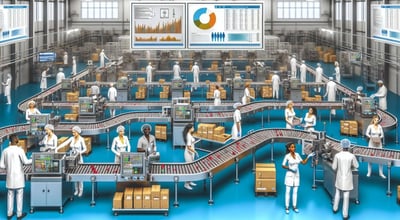Maximizing Production Yield
As a Production Scheduler, your role is crucial in ensuring that the production process runs smoothly and effectively. One of the most critical aspects of this responsibility is optimizing production yield. Maximizing production yield not only improves profitability but also ensures that high-quality medical devices and equipment reach those in need in a timely manner.
In this blog, we will look into the significance of production yield optimization in a medical manufacturing facility and explore how integrating advanced planning and scheduling tools like PlanetTogether with enterprise resource planning (ERP), supply chain management (SCM), and manufacturing execution systems (MES) can streamline operations and drive efficiency.

Production Yield Optimization
Production yield refers to the percentage of usable products obtained from a manufacturing process. In medical manufacturing, where precision and quality control are paramount, optimizing production yield is crucial for maintaining profitability and meeting regulatory standards.
Production yield optimization involves identifying and addressing factors that may cause inefficiencies or defects in the manufacturing process. This includes minimizing waste, reducing downtime, and ensuring consistent product quality. By maximizing production yield, manufacturers can increase output without compromising on quality, ultimately driving profitability and customer satisfaction.
Challenges in Production Yield Optimization
Achieving optimal production yield in a medical manufacturing facility comes with its own set of challenges. These may include:
Variability in raw materials: Fluctuations in the quality or availability of raw materials can impact production yield. It's essential to have robust processes in place to handle material variations effectively.
Equipment downtime: Equipment breakdowns or maintenance can lead to unplanned downtime, reducing overall production yield. Predictive maintenance strategies can help minimize disruptions and keep operations running smoothly.
Process inefficiencies: Inefficient workflows or bottlenecks in the production process can hinder productivity and affect yield. Continuous process improvement initiatives are essential for identifying and addressing these inefficiencies.
Quality control issues: Ensuring consistent product quality is critical in medical manufacturing. Any deviations or defects can lead to costly rework or product recalls, affecting production yield and reputation.


Integration of PlanetTogether with ERP, SCM, and MES Systems
To overcome the challenges associated with production yield optimization, many medical manufacturing facilities are turning to advanced planning and scheduling (APS) solutions like PlanetTogether. These tools leverage advanced algorithms and real-time data to optimize production schedules, minimize downtime, and maximize resource utilization.
Integration between PlanetTogether and ERP, SCM, and MES systems further enhances efficiency and visibility across the entire manufacturing process. Here's how:
Seamless data exchange: Integration allows for seamless data exchange between PlanetTogether and other systems, ensuring that production schedules are based on accurate and up-to-date information.
Real-time insights: By integrating with ERP systems such as SAP, Oracle, or Microsoft Dynamics, production schedulers gain real-time visibility into inventory levels, order statuses, and resource availability. This enables better decision-making and more agile response to changing demand or supply conditions.
Enhanced coordination: Integration with SCM systems enables better coordination between production scheduling and supply chain management processes. This ensures that materials are available when needed, reducing the risk of production delays or disruptions.
Improved traceability: Integration with MES systems provides detailed insights into the production process, including production data, quality metrics, and equipment performance. This enables better traceability and quality control, ultimately enhancing production yield.
In the competitive landscape of medical manufacturing, optimizing production yield is essential for maintaining profitability, meeting customer demands, and ensuring product quality. By leveraging advanced planning and scheduling tools like PlanetTogether and integrating them with ERP, SCM, and MES systems, production schedulers can streamline operations, minimize waste, and maximize efficiency.
The integration between PlanetTogether and systems like SAP, Oracle, Microsoft Dynamics, Kinaxis, Aveva, and others provides production schedulers with real-time visibility, enhanced coordination, and improved traceability across the entire manufacturing process. This enables better decision-making, faster response to changing market conditions, and ultimately, greater success in the highly regulated and demanding field of medical manufacturing.
Are you ready to take your manufacturing operations to the next level? Contact us today to learn more about how PlanetTogether can help you achieve your goals and drive success in your industry.

